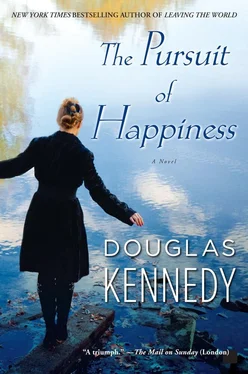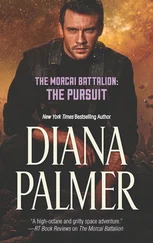'Oh, please...' I said, turning beet red. 'I've only published one story'.
'But what a story', George said. 'Don't you agree, Emily?'
'Absolutely', she said. 'Everyone in the department thought it was one of the top three or four stories we published last year. And considering that Faulkner, Hemingway and J.T. Farrell were the other three writers
'Stop!' I said. 'Or I'll crawl under the table'.
Emily groaned. And said, 'What this woman needs, George, is a massive dose of self-confidence'.
'Well, I'm the man for the job', he said with a smile.
'And you must convince her to leave Saturday/Sunday before it kills her talent'.
'It was just one damn story', I said. 'I doubt I'll ever write another'.
'Of course you will', George said. 'Because after we're married, you won't have to worry about paying the rent anymore, or even having to put up with the dreadful Miss Spenser at Saturday/Sunday. You'll be free of all that, and able to concentrate full time on your fiction'.
'Sounds great to me', Emily said.
'I'm not at all sure if I'll be leaving Saturday/Sunday right away', I said.
'Of course you will', George said sweetly. 'It's the ideal moment to make the break'.
'But it's my job...'
'Writing's your real job... and I want to give you the opportunity to do it full time'.
He leaned over and kissed me on the forehead. Then he stood up and excused himself.
'Nature calls', he said with a chuckle. 'How about getting another couple of drinks. Being in love is thirsty work'.
I smiled. Tightly. And found myself thinking, what a dumb line. Instantly, my mind replayed some of our lovey-dovey conversation ('Hey, I'm the real lucky one here... I mean, I'm marrying one of the most promising writers in America'). I couldn't believe that we were already exchanging 'settled married couple' epithets like darling and my love. I felt myself flinch. It was just a minor contraction of the shoulders. It couldn't have lasted more than a nanosecond. But in the aftermath of that tiny shudder came a question: was that the first twinge of doubt?
Before I had time to consider that query, Emily said, 'Boy, are you one lucky girl'.
'Do you think so?'
'Think so? He's wonderful'.
'Yes. I guess he is'.
'Guess? Guess? Don't you see what you've landed?'
'A very nice man'.
'Nice? What's happened to you tonight? Did you take "understatement" tablets or something?'
'I'm just... I don't know... a little nervous, that's all. And I could really use another martini. Waiter!'
I caught the eye of a passing man with a tray, and motioned for a refill.
'Of course you're nervous', Emily said. 'You're getting married. But, at least, you're marrying someone who clearly adores you'.
'I suppose so...'
'Suppose? He worships the ground you walk on'.
'Wouldn't you find it a bit worrying if you were the object of such adoration?'
Emily rolled her eyes and gave me a dark frown. 'Will you listen to yourself', she said. 'Here you are - a published writer, engaged to a man who actually believes in your talent, who's going to free you from the worry of earning a living so you can dedicate yourself completely to your "art", and who also considers you the most wonderful person on the planet. And all you can talk about is your fear of being adored. I mean, really'.
'Everyone's entitled to a few last-minute doubts, aren't they?'
'Not when they've landed the catch of the year'.
'He's not a fish, Emily'.
'There you go again!'
'All right, all right...'
'Tell you what: if you really don't want to marry George, I'm happy to take your place. In the meantime, try to accept the fact that you've struck it lucky in love. I know it's difficult for you to admit such a terrible thing...'
'Emily: I am in love. I'm just... anxious, that's all'.
'I wish I had your problems'.
'Hey there!'
We both looked up. George was approaching the table, his mouth frozen in an expansive grin. People were always describing him as 'boyish' - and with good reason. With his perfectly parted sandy hair, his heavy horn-rimmed glasses, his slightly chubby freckled face, and his ability to look a little disheveled (even when dressed in one of the made-to-measure Brooks Brothers suits he favored), he always had a certain schoolboyish demeanor: someone who, even at the age of twenty-eight, would still appear at home on a soccer field at Exeter (his prep school alma mater).
But as he came and sat down with us, I found myself looking beyond his current adolescent veneer, and seeing what he would become twelve years from now: a portly middle-aged banker whose youthful countenance had been replaced by a staid stoutness. A man of bulk and leaden gravity, with no lightness of touch, no animating spirit.
'Something the matter, darling?'
His voice registered concern. I snapped out of my anxious trance, and gave him a warm, loving smile.
'Just a little far away, dear'.
'I bet she's plotting her next story', he said to Emily.
'Or dreaming about the wedding', Emily said, with more than a hint of irony which my fiance failed to pick up.
'Oh, so that's what you girls were talking about!'
Ugh.
Yes, I knew that George Grey was a deeply conventional man. And yes, I knew that he was someone who would always have his feet firmly planted on terra firma. There was nothing fanciful or capricious about George. When he tried to be passionately romantic, he often came across as downright silly. But he also had the disarming (and rather attractive) ability to admit that he lacked imagination, and couldn't really engage in flights of fancy. On our third date, he confessed:
'Give me a set of company accounts, and I can be engrossed for hours - like someone turning the pages of a really good novel. But play me a Mozart symphony, and I'm lost. I really don't know what to listen for'.
'You don't have to listen for anything in particular. You just have to like what you hear. It's what Duke Ellington once said, "If it sounds good, it is good."'
He stared at me with wide-eyed admiration. 'You are so damn smart'.
'Hardly', I said.
'You're cultured'.
'You're not exactly from the Bronx, George. I mean, you did go to Princeton'.
'That's certainly no guarantee of ending up cultured', he said - and we both laughed like hell.
I liked his self-deprecatory humor. Just as I also liked the way he showered me with books and records and nights at the theater and Sunday afternoon New York Philharmonic concerts - even though I knew that, for George, listening to Rodzinski conduct an all-Prokofiev program was the musical equivalent of two hours in a dentist's chair. But he would never let on that he was bored. He was so eager to please; to learn.
He was also a voracious reader - largely of hefty factual books. I think he was the only man I ever met who'd actually read all four volumes of Churchill's The World Crisis. Fiction, he admitted, was not one of his great interests. 'But you can teach me what to read'.
So I gave him a present of Hemingway's A Farewell to Arms. The morning after, he called me at Saturday/Sunday.
'God, what a book', he said.
'You've finished it already?'
'You bet. He can really tell a story, can't he?'
'Yes, Mr Hemingway does have that ability'.
'And the stuff about the war... it's real sad'.
'Were you moved by the love story between Frederic and Catherine?'
'I had tears running down my face during that final scene in the hospital'.
'I'm glad to hear that'.
'But you know what I was thinking after I put the book down?'
'What, my love?'
'If only she'd had a good American doctor looking after her, she would have probably pulled through'.
'Uh... I'd never thought that. But, yes, I'm sure that's true'.
Читать дальше












